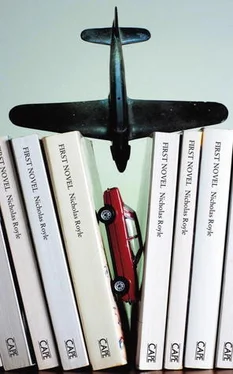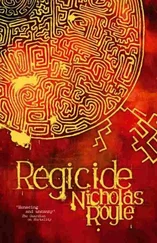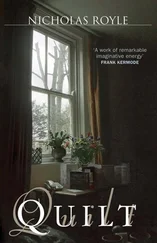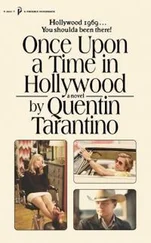But someone in the workshop almost definitely was.
It could have been her.
The five-pound note I found on him might not have been the only one in his possession when he hit the ground.
‘It’s not just first novels,’ I say. ‘I’m interested in first novels that have been lost or suppressed or never followed up.’
I wonder if I have said too much. It is not usual for a lecturer to be forced to justify his choice of texts to an undergraduate.
The tea arrives, the slices of cake.
‘What do you mean?’ she asks.
I have a sip of tea.
‘Well, like John Banville’s Nightspawn . Every so often, when Banville brings out a new novel, his backlist gets reissued with new covers and so on. But you’ll never find his first novel, Nightspawn , included in these reissues.’
She nods.
‘Jane Solomon and Angelica Jacob both wrote brilliant, or at least very promising, first novels and then never wrote anything else. Or nothing else ever appeared.’
‘Why not?’
I shake my head. ‘Solomon became a tango instructor. Jacob — I don’t know. She wrote art criticism. One or two short stories. But as far as I know she didn’t write another novel. I find this very interesting.’
Grace raises her eyebrows, seemingly encouraging me to go on.
‘It wouldn’t be interesting if the novels were no good,’ I say. ‘You’d think they got it out of their system and let’s just be thankful they don’t feel the need to foist another worthless novel on the world. It’s not like we’re short of books. But Hotel 167 and Fermentation were both good novels, so why no more? Why do we hear no more from these very talented writers while others, far less talented, continue to write book after book after book?’
With her fork, Grace divides her slice of cake into quarters. She places one of these into her mouth and chews it slowly, without any expression. She drinks some tea.
‘What about your first novel?’ she says.
‘What about it?’ I ask before I can stop myself.
‘Why don’t you put that on the list?’ Her mouth is twisted into an approximation of a smile. ‘I mean, is it any good? Why is it impossible to track down? Why haven’t you written a second novel?’
Now I smile, and take another sip of tea.
‘So many questions, Grace,’ I say.
She gives a little laugh to acknowledge my having avoided them.
‘I am writing a novel at the moment,’ I say.
‘Is it your first?’ she asks, a sly smile playing around the corners of her mouth.
‘It will be the first to appear under the name Paul Kinder.’
‘So, what, your first appeared under a pseudonym?’
‘This cake is very good,’ I say.
‘Hmm.’
‘What about you?’ I ask. ‘Are you writing a novel?’
‘Should I be?’
‘As an undergraduate, you are not expected to.’
‘But what’s to stop me?’
‘Nothing.’
We watch each other for a moment like two chess players between moves.
‘If I were writing a novel,’ she says, ‘even though there’s no expectation of me to do so for the course, would I be within my rights to ask one of the tutors to offer supervision?’
‘There would be no harm in asking,’ I say, choosing my words with the same level of care.
‘Maybe,’ she says, polishing off her last forkful of cake, ‘I should make an appointment to see you in your office.’
‘You’ve got my number.’
The following morning, I stand in the bay window of the bedroom, next to the mannequins, and watch as parents drop their children off at the school. I see Carol walk past on the opposite side of the road with her youngest — the two children she has with AJ. Her two older children, Samantha and Thomas, whom she must have had when very young, spend most of their time with their father — by amicable agreement, she once assured me — and attend school in Altrincham. Carol’s hair is tied back in a ponytail and she is dressed in a smart blue jacket and skirt and white blouse, clearly about to drive to the airport once she has dropped the children off.
Just when I think she has gone too far, she turns and looks at the house, her eyes scanning the downstairs windows before looking up. She lets go of a small hand to wave. I raise a hand in response. The children look up and point and laugh; they think the dummies are funny.
The dummies are not funny. Sylvia Plath did not find dummies funny. There’s a line in The Bell Jar : ‘The figures around me weren’t people, but shop dummies, painted to resemble people and propped up in attitudes counterfeiting life.’
Once Carol and the children have crossed the main road to gain entrance to the school, I turn away from the window. I am wearing my gardening clothes, but I am in no hurry to get started. On the landing outside the bedroom is a white bookcase. In it I keep Picador paperbacks from the 1970s, 80s and 90s. At some point in the 90s Picador abandoned the classic design of white spine and black lettering with uniform typography. They still occasionally publish some interesting books — Bret Easton Ellis’ Lunar Park , John Banville’s recent novels — but they don’t look the same and so I don’t collect them.
The way things look is important.
Dummies are all about look.
The first four shelves contain my collection, from Aragon’s Paris Peasant to B. Wongar’s The Track to Bralgu , and the last shelf and a half is where my wife Veronica’s Picadors reside. She didn’t collect them seriously, not like I did, but when we got together, I combined my Picador collection with those that she happened to have among her books, for she was a reader. Where her Picadors finish, halfway along the bottom shelf, eggshell-green Penguin Modern Classics fill up the rest of the space. As I buy more Picadors, from charity shops and the few second-hand booksellers that remain in business, the Penguins are edged out and shelved elsewhere.
I have read one or two of these books more than once. Perhaps half of them I have read once. The other half comprises books I intend to read one day and books I doubt I will ever read, either because I will run out of time or because I am not sufficiently interested, but they have the right look, so I buy them and keep them on the shelf.
The house sits silently on its foundations as I slide out my old copy of First Love, Last Rites and replace it with the one from the Didsbury Bookshop. I place the old one on top of the bookcase; I will take it up to my study when I am next going.
I run my finger across the spines of the Ss. Saki’s short stories, a novel by Nicholas Shakespeare, Iain Sinclair’s poetry anthology. And on to the Ts. Emma Tennant’s Hotel de Dream : there are two copies of this novel. One on my shelves, one on Veronica’s. I take them both out and lay them side by side on the carpet.
I can’t work out what is more interesting, either their being virtually identical or that there are minor differences of appearance. One is creased at the top corner, the other slightly foxed along the bottom edge. I flick through both copies, one after the other. They smell exactly the same. They smell of second-hand bookshops, cardboard boxes, spilt tea. The faintest hint of cigarettes. Futility. Time.
I take out the five other books by Emma Tennant on Veronica’s shelf. The Bad Sister, Wild Nights, Alice Fell, Queen of Stones, Woman Beware Woman . I place them next to each other. I compare them in terms of smell, cover design, number of pages.
Cleo comes and brushes against my leg.
‘Hello, Cleo,’ I say. ‘What do you think? Either I mix Veronica’s books in with mine or move them elsewhere.’
Читать дальше












